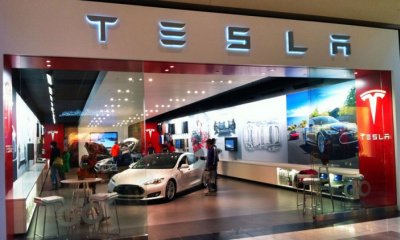Tesla closing stores, revealing Model Y: Tesla is taking a giant leap on the car-selling front: closing down most of its shopping-mall stores, switching to online sales to cut down  the high costs of running sales offices. Tesla wants to keep its pricing competitive especially on the Model 3 that starts at $35,000 while increasing the profit margin. The company does benefit from hosting invitation-only ride-and-drive events in major cities, which takes away some of the imperatives to operate retail stores. It will also be the hub for the next electric vehicle coming out, the crossover Model Y. Tesla will be revealing it March 15 at an event at the Los Angeles Design Studio, according to a recent tweet by CEO Elon Musk. It’s said to be 10% larger than the Model 3 and will cost about 10% more and will have slightly less range from the same battery. It will also share the same platform to save costs. It won’t have falcon wings like the Model X. The goal is to reach volume production of the Model Y by the end of 2020.
the high costs of running sales offices. Tesla wants to keep its pricing competitive especially on the Model 3 that starts at $35,000 while increasing the profit margin. The company does benefit from hosting invitation-only ride-and-drive events in major cities, which takes away some of the imperatives to operate retail stores. It will also be the hub for the next electric vehicle coming out, the crossover Model Y. Tesla will be revealing it March 15 at an event at the Los Angeles Design Studio, according to a recent tweet by CEO Elon Musk. It’s said to be 10% larger than the Model 3 and will cost about 10% more and will have slightly less range from the same battery. It will also share the same platform to save costs. It won’t have falcon wings like the Model X. The goal is to reach volume production of the Model Y by the end of 2020.
Lyft goes public: Lyft has beaten ride-hailing giant Uber to the stock market with its initial public offering on Friday, raising about $100 million from placeholders. It will be traded on the Nasdaq market under the stock ticker LYFT. If Uber does make it soon the stock market, shareholders will be buying into companies that have been growing substantially while taking significant losses. Lyft’s net loss climbed to $911 million in 2018 from $688 million a year earlier. Uber lost $1.8 billion last year, according to a recently released filing by the market leader. Investors have to decide whether losses will continue for the next few quarters. Uber and Lyft have been fast-growing businesses inspiring many other mobility startups, which is part of the appeal. Lyft estimated last fall that it had reached 35% of U.S. market share. Market analyst firm Second Measure reported in October that Uber held 69.2% of U.S. market share, and Lyft had 28.4%.
DOE research funding: The U.S. Department of Energy announced availability of up to $51.5 million for research of technologies for trucks, off-road vehicles, and the fuels that power them. Funded through DOE’s Office of Energy Efficiency and Renewable Energy (EERE), this FOA addresses priorities in gaseous fuels research, including natural gas, biopower, and hydrogen; heavy-duty freight electrification; hydrogen infrastructure and fuel cell technologies for heavy-duty applications; and energy efficient off-road vehicles. “As the fastest growing fuel users, trucks offer an important opportunity to use innovation to improve energy productivity,” said Under Secretary of Energy Mark Menezes. “Through research and new developments in both energy efficiency and domestically-sourced fuel technologies, we can not only strengthen our energy security but also improve transportation affordability for our nation’s trucking industry – helping those who deliver American goods and those who use them.”
China’s EV market explored: The “60 Minutes” news show recently broadcasted an in-depth look at China’s booming “new energy vehicle” market. Even with the possibility of generous government incentives being cut back, China is still the hottest electric vehicle market in the world. The U.S. had been the hub for years, but has been falling behind China in consumer and fleet EV purchases. Government incentives are getting harder to find as the Trump administration backs away from EV income tax incentives; and talks between the federal government and California on the state’s zero emission vehicle program have reached a stalemate. Chinese EV startup Nio was featured in the “60 Minutes” report, which helped its stock prices shoot up 8 percent last week. Nio sees itself as a Tesla-competitor. The startup has benefited from its price being about half of that of a Tesla in the Chinese market, and it doesn’t pay import taxes as it manufactures locally. Tesla hopes to cut that down, along with competition from majors in the market, by setting up its own plant and cutting away shipping costs and import taxes.



